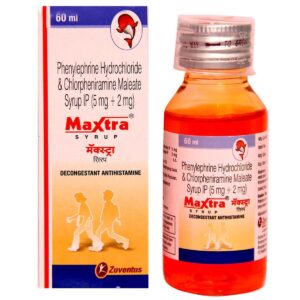DECONGESTANT + ANTIHISTAMINE
Decongestant: Decongestants are a type of medication used to relieve nasal congestion or stuffiness caused by allergies, hay fever, common cold, or sinusitis. They work by constricting the blood vessels in the nasal passages, which helps to reduce swelling and congestion.
The most common form of decongestants is available over the counter in oral or nasal spray forms. The active ingredients in these medications are either pseudoephedrine or phenylephrine. Pseudoephedrine is a sympathomimetic drug that stimulates alpha-adrenergic receptors, causing vasoconstriction and reducing nasal congestion. Phenylephrine works similarly, but its vasoconstrictive effects are primarily on the venous system.
The oral dosage of pseudoephedrine for adults is usually 60 mg to 120 mg every 4 to 6 hours, with a maximum daily dose of 240 mg. Phenylephrine is typically given in doses of 10 mg to 20 mg every 4 hours, with a maximum daily dose of 60 mg. However, it is important to follow the specific dosing instructions provided by the manufacturer or consult a healthcare professional.
Common side effects of decongestants include increased blood pressure, increased heart rate, nervousness, restlessness, insomnia, headache, and dry mouth. Pseudoephedrine, in particular, can also cause gastrointestinal disturbances, dizziness, and urinary retention. It is worth noting that decongestant sprays should not be used for more than a few days continuously, as they can cause rebound congestion, worsening symptoms when stopped abruptly.
Decongestants are generally not recommended for individuals with certain medical conditions, such as hypertension, heart disease, glaucoma, hyperthyroidism, or urinary retention. It is essential to consult a healthcare professional before using decongestants, especially if you have any pre-existing medical conditions or are taking other medications.
In summary, decongestants are medications used to alleviate nasal congestion caused by allergies or respiratory infections. They work by constricting blood vessels in the nasal passages. Common side effects include increased blood pressure, increased heart rate, and nervousness. It is important to use decongestants as directed and to seek medical advice if you have underlying health conditions or concerns.
Antihistamine: Antihistamines are a class of drugs used to manage various allergic conditions such as hay fever, allergic rhinitis, urticaria (hives), and allergic conjunctivitis. They work by blocking the effects of histamine, a chemical that is released by the body in response to an allergic reaction.
Histamine is responsible for causing symptoms such as itching, sneezing, runny nose, and watery eyes. By blocking the action of histamine, antihistamines help relieve these symptoms and provide relief to individuals suffering from allergies.
Antihistamines are available in different forms, including tablets, capsules, liquids, nasal sprays, and eye drops. The dose and frequency of use may vary depending on the specific antihistamine and the individual’s age, condition, and other factors. It is essential to follow the instructions provided by the healthcare professional or those mentioned on the product label.
Common side effects of antihistamines include drowsiness, dizziness, dry mouth, blurred vision, and constipation. The sedating effects are more pronounced with older first-generation antihistamines such as diphenhydramine and chlorpheniramine. Newer second-generation antihistamines like loratadine, cetirizine, and fexofenadine are less likely to cause drowsiness.
While antihistamines are generally considered safe, it is important to consult a healthcare professional before taking them, especially if you have any underlying conditions or are taking other medications. They may interact with certain medications, and certain antihistamines are not recommended for certain groups, such as pregnant or breastfeeding women.
In summary, antihistamines are drugs used to alleviate symptoms associated with allergic conditions by blocking the effects of histamine. They are available in various forms, and their use, dose, and side effects may vary. It is recommended to consult a healthcare professional for proper guidance and to ensure safe and effective use.

